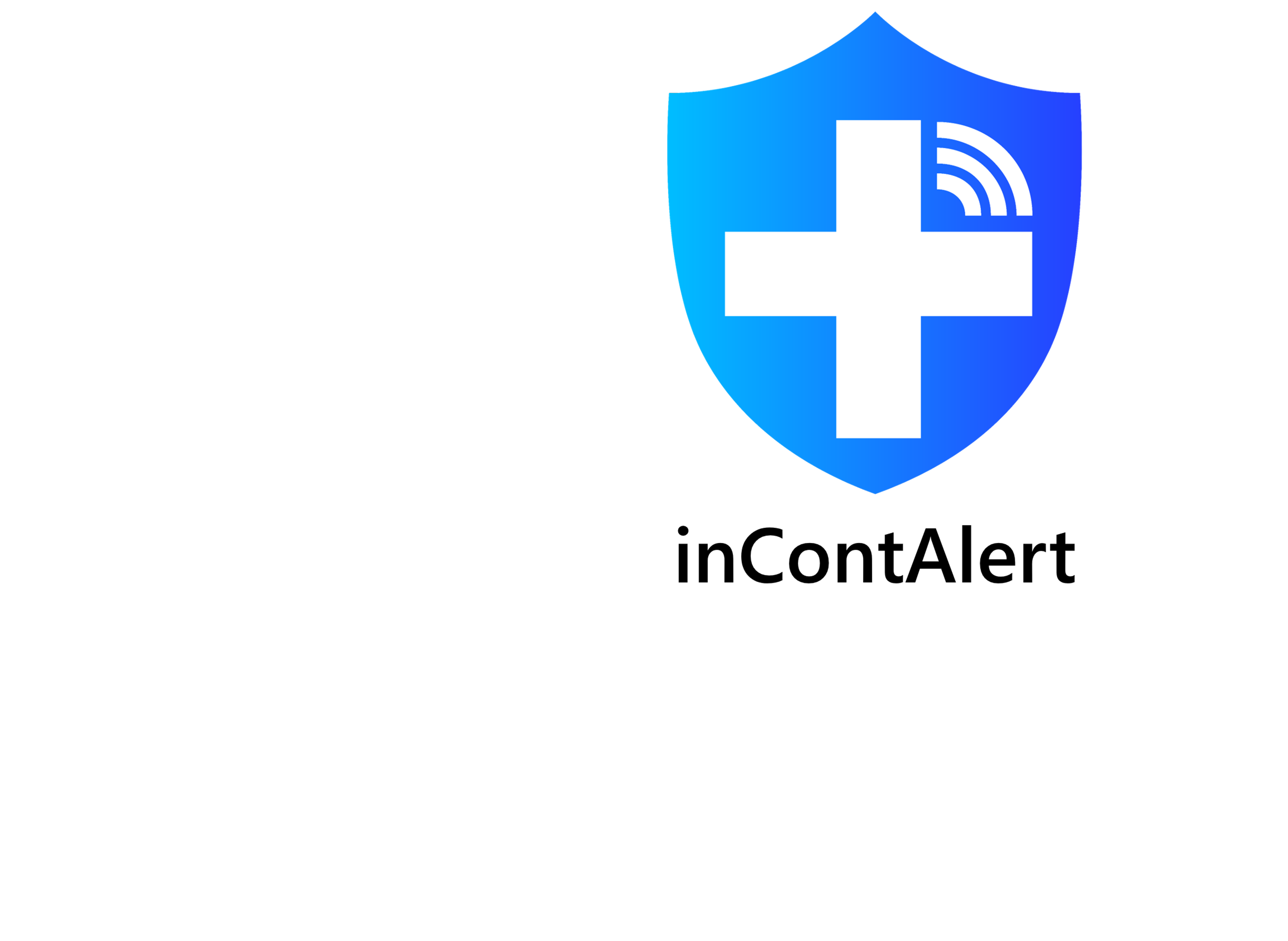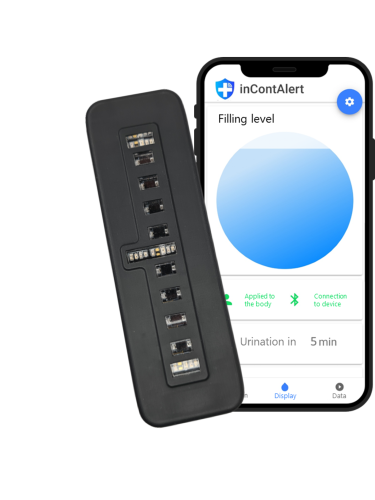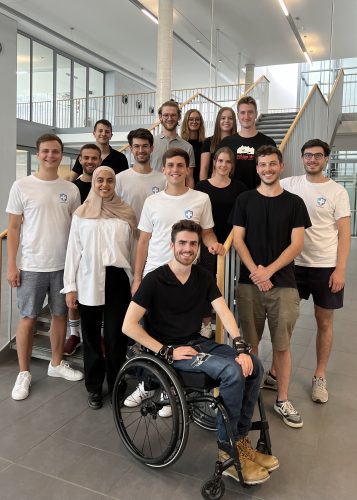In conversation with Praxis SCI Incubate Cohort Member, inContAlert

inContAlert is a Germany-based start-up that developed a wearable technology that scans the bladder unobtrusively throughout the day. The wearable is worn two fingers above the pubic bone and fastened with the waistband of the underpants, a smart belt, or a patch. Analyzing the patient’s data through deep learning algorithms, the information is then displayed on an app (outpatient/ private use) or a dashboard solution (clinical use). It ultimately sends an alert to the incontinence patient or nurse when a predefined filling level is reached.
Praxis supported inContAlert as part of Praxis SCI Incubate Program 2023. SCI Incubate Program is a four-month program geared towards early-stage innovation projects that address care- and cure-related treatments and quality of life for people with spinal cord injury (SCI).
The virtual program, based in Vancouver, Canada, is designed for pre-prototype ventures to scale their innovations rapidly. The SCI Incubate Program builds targeted support into the design and prototyping process through weekly mentorship from their in-house persons with lived experience (PLEX), and research and commercialization experts.
Jannik Lockl, Co-founder and CEO of inContAlert, in conversation with Praxis, talks about monitoring bladder fullness for people with urinary incontinence.
What led you, in terms of your education, experience, and the people you’ve encountered, to pursue a career focused on medical technology?
My PhD topic was on Emerging Digital Technologies, and my colleagues have studied electrical engineering. All of us wanted to start an entrepreneurial journey. While searching for innovations that inspire us, we came across an international business plan conference in Hong Kong with the topic “HealthTech for Seniors”. Throughout this competition, there were a lot of talks about dementia, falling when you’re elderly, and to solve incontinence issues. Specifically, the latter case was a turning point. We wanted to address incontinence issues at its core and decided to develop something that would help people with limited bladder sensation by tracking and providing them with information about bladder fullness.
What was your biggest learning or takeaway from the SCI Incubate program?
In the past, we have participated in several accelerator and incubator programs on different topics. We wanted to participate in the Praxis Incubate Program to more closely understand the unique needs and challenges of our potential end-users – people with spinal cord injuries. The program provided us with opportunities to engage directly with individuals living with spinal cord injuries. There is perhaps no other program in which, every week, you receive intensive mentoring from people with lived experience (PLEX) to discuss the actual usability and the actual use in real-world scenarios. By concentrating on spinal cord injuries and the associated incontinence issues, we have been able to effectively shape and define our initial use case, aligning our prototype closely with the needs of this specific user group.
The program not only enriched our product development but also facilitated our entry plan into the North American market. Through this, we’ve gained crucial connections, including the Praxis team, regulatory advisors, market entry specialists, and medical device experts, which might have been challenging to access otherwise. This has provided a substantial advantage to our European-based start-up.
What were the most significant changes to your start-up’s product and business strategy during the program?
During the program, we made some alterations, primarily focusing on the prototype’s hardware and fixation module. We initially thought to exclude the possibility of users fixing the device with a patch due to concerns about skin issues. However, based on the mentorship advice from the PLEX team, we delved deeper into this area and now plan to develop our own adhesive patch solution for securing the sensor device on the body. This shift in strategy was influenced by insights gained during the Praxis Incubate Program.

How has your understanding of your users evolved during the program, and have there been any surprising insights or changes in your perspective?
Our understanding of our users has indeed evolved during the program. An eye-opening moment occurred when we discussed the issue of sensation, particularly related to the abdominal area. This perspective varies significantly between individuals like us who don’t have spinal cord injuries and the individuals who do. Unlike us, they lack muscles in the region where our device is worn, which affects their experience and usage of the device. They might wear it in different positions than we would have initially assumed. This newfound understanding is shaping our product development and our understanding of how users will interact with our device.
Did your perspective change on how consumers, and/or clinicians would use your product in the course of their normal activities? If so, what aspect of the program helped make this shift and how has it impacted your start-up’s approach to product development?
The program has indeed provided us with valuable insights, particularly in the context of the North American market. In North America, we anticipate that a higher proportion of our potential users may also be actual customers compared to the European or Western European markets. This distinction arises from differences in insurance and healthcare systems. In Europe, where healthcare systems and insurance commonly cover medical expenses, insurance companies often serve as the primary customers for products such as inContAlert. In contrast, in North America, where insurance coverage for such products is less common, end users may take on a more direct role as customers. This insight has prompted us to rethink our customer dynamics and tailor our strategies accordingly for each market.
From a marketing perspective, our approach remains rooted in addressing the medical need. We focus on providing individuals who lack sensation in their bladder and the information they need. However, our value proposition has evolved slightly. We now emphasize the importance of timely catheterizations to prevent unplanned overfilling or other complications. Participating in the Praxis Program has revealed a shift in emphasis, particularly in the North American market. Here, there is a heightened focus on time savings alongside medical cost considerations. In contrast to Europe, where single-use catheters are prevalent, some users in North America might be reusing catheters due to varying and limited insurance coverage. Consequently, such users value the time saved from fewer catheterizations, allowing them greater freedom in their daily routines. This shift makes the time-saving aspect of our product more prominent in the North American market compared to Europe.
What differentiates your start-up, and its value proposition, from the competition? How are you disrupting your marketplace?
Our primary competition lies in challenging the conventional gold standard, which involves emptying the bladder at fixed time intervals. Our potential solution seeks to diverge from this approach and instead focuses on a technical solution. While there are some ultrasound devices in the market attempting to address this issue, they may be hindered by technical drawbacks. In contrast, inContAlert offers a unique technical solution that has the potential to surpass the traditional gold standard and other existing approaches. Our device provides real-time feedback on bladder filling, delivering users a more convenient and passive means of managing their bladder compared to the active process of using portable ultrasound devices.

Is there a story you’d like to share from the program when your engagement with a person with lived experience (clinician, person with SCI, care provider) was impactful to you or your start-up development?
We conducted a user study during the Praxis Program, during which participants provided feedback on our prototype. This feedback, particularly regarding the use of a patch, was valuable for usability considerations.
Further, our conversation with the Praxis PLEX team was impactful. We discussed differences in abdominal regions and how these differences affect device wearability. The PLEX team emphasized that individuals with long-term spinal cord injuries may have distinct physical conditions, prompting us to focus on both technical and usability aspects to ensure our device is convenient and comfortable for the end users.
What did you hope you get out of the SCI Incubate program and did you? What makes the Praxis SCI Incubate program so unique?
Our primary objectives were to create connections in North America and engage with individuals with lived experience. Initially, our main emphasis was establishing relationships with those with lived experience, followed by our entry into the North American market. The SCI Incubate Program stood out to us because of its unique PLEX mentorship and specialized guidance for entering the North American market. When evaluating accelerator programs, we initially had reservations, but we ultimately decided to apply for the Praxis SCI Incubate Program when it aligned with our development stage. This opportunity allowed us to transition from proving our technology’s functionality to demonstrating its value to end users through a proof-of-concept stage.
What would you say to start-up founders who may be on the fence about participating in the SCI Incubate program? What value do you think it adds?
Praxis SCI Incubate Program offers a unique opportunity to forge deep relationships with individuals who have lived experience and are enthusiastic about providing feedback to enhance your prototype significantly. I would stress that if your goal is to gain profound insights into your target market, the SCI Incubate Program would be a good choice. However, I would also consider specific circumstances. If a start-up already has founders with lived experience deeply embedded in their community and highly engaged with the potential end users, they may lean towards programs with a stronger technological focus. Nonetheless, such scenarios are uncommon, and for the majority of start-ups, I would strongly advocate joining this program to truly get to know your end users, making it an ideal fit.
